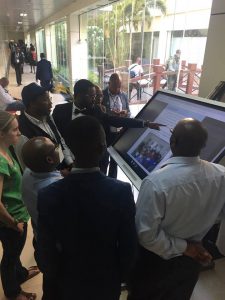We just finished up an inspiring week in Maputo, Mozambique for AFENET – our fist assignment in Africa.
 The African Field Epidemiology Network (AFENET) in collaboration with Mozambique’s National Institute of Health and the Mozambique Field Epidemiology and Laboratory Training Program organised the 7th AFENET Scientific Conference. Over 400 iPosters were presented around the theme of Building Resilient and Sustainable Public Health Systems in Africa through Field Epidemiology Training.
The African Field Epidemiology Network (AFENET) in collaboration with Mozambique’s National Institute of Health and the Mozambique Field Epidemiology and Laboratory Training Program organised the 7th AFENET Scientific Conference. Over 400 iPosters were presented around the theme of Building Resilient and Sustainable Public Health Systems in Africa through Field Epidemiology Training.
AFENET was established in 2005 as a non-profit organization and networking alliance of African Field Epidemiology (and Laboratory) Training Programs (FELTPs), and other applied epidemiology training programs.
AFENET is dedicated to helping ministries of Health in Africa build strong, effective, and sustainable programs with capacity to improve public health systems partnering with global public health experts. The network’s goal is to strengthen field epidemiology and public health laboratory capacity to contribute effectively to addressing epidemics and other major public health problems in Africa.
AFENET operates in 31 African countries: Angola, Benin, Botswana, Burundi, Burkina Faso, Cameroon, Cote d’Ivoire, Democratic Republic of Congo, Ethiopia, Gambia, Ghana, Guinea Bissau, Guinea Conakry, Kenya, Liberia, Mali, Mauritania, Mozambique, Namibia, Niger, Nigeria, Rwanda, Senegal, Sierra Leone, South Africa, South Sudan, Tanzania, Togo, Uganda, Zambia, and Zimbabwe